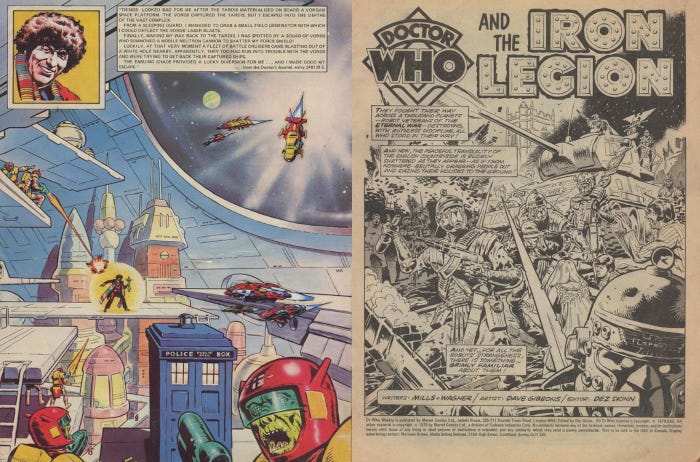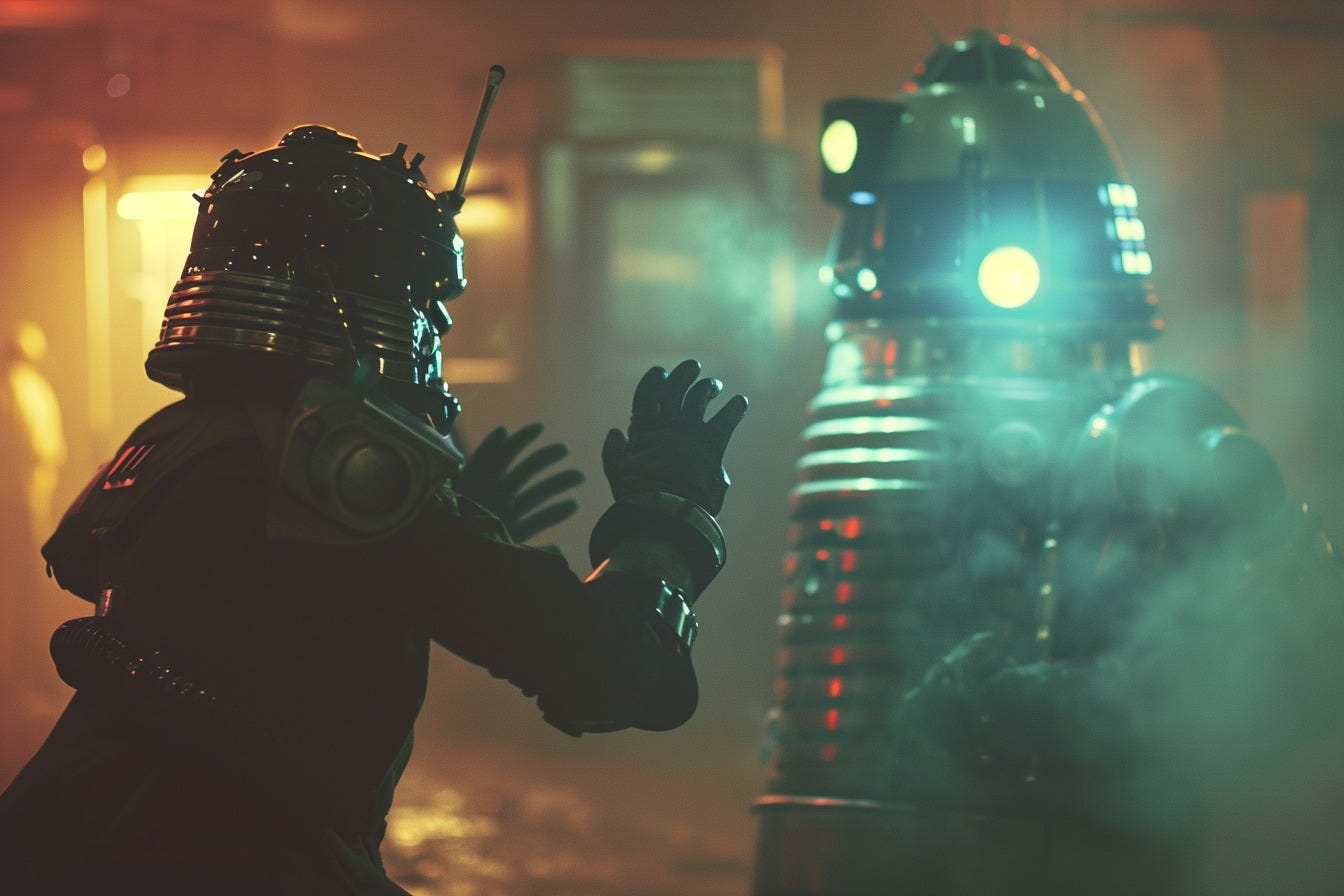Doctor Who: Bigger on the inside than the outside
How do you explain the implications of being a "Time Lord" with two hearts? A time-traveling humanoid who uses a blue police box as a time machine? Well, why not in a quantum way?
How could you define Doctor Who in a few words? For me, it always felt like a box that I could open every time and get something out of it. Just something different and unexpected. I was a kid, it was just me and Doctor Who in the house, and in those moments everything else didn’t count. But, then, Who is Doctor Who? I don’t think it’s possible to explain it, how do you explain the implications of being a "Time Lord" with two hearts? A time-traveling humanoid who uses a blue police box as a time machine, and a screwdriver to solve the most bizarre and surreal situations?
Well, let’s try some words to give a view of all this.
One of a kind
As everyone knows, Doctor Who is a British science fiction television program produced by the BBC, which first aired in 1963 and is still on the air today. Originally intended for children, it is the brainchild of Sydney Newman (1917-1997), C. E. Webber (nicknamed Bunny, 1909-1969) and Donald Wilson (1910-2002). Newman was a major figure in British television from the late 1950s to the late 1960s. While working at the BBC, he was responsible for creating two hugely popular entertainments, The Avengers and Doctor Who. Newman had always been a science fiction enthusiast, so much so that he said:
“I’m in my 40s and I don’t think I have a science fiction book I haven’t read. What I like most about science fiction is that you
can safely and wonderfully say bad things about our society.”
Newman never wrote the episodes as well as his colleagues, but he was the one who came up with the idea of a time machine that was bigger on the inside than on the outside (the TARDIS), and the character of the mysterious “Doctor”, virtually the entire substance of the show. Webber wrote the first script for the series, but he was not considered a good writer, so his draft script for the first episode was rewritten by Anthony Coburn (1927-1977) but Webber received a co-writing credit. In 1971, Wilson claimed that he was the “father” of the name of the show, which Newman confirmed. Much of the initial development work on the show was done by Wilson himself. Thus, Doctor Who was meant to be a children’s show, educational in its approach, including voyages, discoveries, and scientific concepts, but used in a “fantastical” way. And it is still considered a one of a kind series.
Brilliant
The TARDIS (the sentient police box the Doctor uses to explore the universe) is made the way it is, a blue British police box, because it was exactly the kind of box that British people could find wandering the streets of British cities. Isn’t that brilliant? The TARDIS (Time And Relative Dimension In Space) is a time machine, but it’s also a spaceship. Its interior is much larger than its exterior, thanks to his Dimensional Transcendence. You wonder what this Dimensional Transcendence could possibly be, you know that transcendent means beyond normal human experience. But you also know that this explanation sounds like pure science fiction, the beautiful, awesome sort, full of unfathomable possibilities. In the story, it is a technology that allows the existence of inner space in a different dimension than outer space. Say, again, ain’t that brilliant? Sure, I’s not science, it’s not verifiable, it’s not so realistic. But in the fictional world in which the Doctor’s stories take shape, the concept works perfectly and you won't find it anywhere else. Brilliant!
Long-lived
Begun in 1963, production of the series was halted in 1989 by Jonathan Powell, controller of BBC 1. In 1996, there was a co-production by Fox, Universal Pictures and the BBC, which aired on the Fox network in 1996. This film was very successful in the United Kingdom, but had little success in the United States and did not result in a series. In the meantime, radio programs, novels, and comic books have been produced, but no series. In September 2003, BBC Television announced the production of a new series. On March 26, 2005, Doctor Who returned to BBC One with the episode Rose. Since then, there have been six more series, in 2006-2008 and 2010-2012. There have also been annual Christmas specials since 2005. The modern series is still running. Why does this show continue to appeal? Its fortune lies in the mystery that it generates, in its way of attracting more by what it does not reveal than by what it discloses.
Kennedy and Doctor Who
The first episode of Doctor Who was broadcast on November 23rd 1963, the day after the assassination of President Kennedy in Dallas. This is probably the reason why it was aired late, as television stations around the world were devoting much of their time to news the events in the United States. Well, the broadcast was only delayed by eighty seconds and was rerun on November 30th, just before the second episode aired. In the first episode, An Unearthly Child, two teachers, Barbara Wright and Ian Chesterton, follow their smartest and most enigmatic student, Susan, to her home, only to discover that she lives near a blue police box, the kind used in the United Kingdom at the time to call the police if you witnessed a crime. The two teachers manage to get inside the box and discover that it is much larger on the inside than it is on the outside, and what's more, it is shaped like a highly advanced spaceship. Once inside, they find Susan, but also her very eccentric grandfather, the Doctor, who decides they know too much about his and Susan's alien origins, so takes them on a journey through time and space in his TARDIS, the place he and Susan call home.
Quantum
All right, let's get to the point, because a lot of people have written and talked and discovered things about Doctor Who. Well, think about this. At first, it is almost impossible to figure out who (or what) the Doctor is. Everything around him is strange. It is known that he is a alien traveler with an intelligence outside the norm, who acts to fight against injustices that occur in different places, but also in different “times”. His space-time explorations are made possible by the TARDIS and its aforementioned “dimensional transcendence”. To be honest, in the early episodes, the Doctor is a little creepy, intimidating, seeming like a restless man unable to find a safe place, especially since, as we later learn, he is a fugitive, one on the run from the Time Lords of the planet Gallifrey, essentially on the run from his fellow aliens.
The great thing is that as the story goes on, each answer opens up more questions about his identity. We start to talk about incarnations. The concept of reincarnation is inherent in the character, aside from the famous cast changes over the years. Reincarnation has always been a fascinating myth for humans, a way to ward off death. But here it becomes a mystery within a mystery and something different, I think. We are talking about the regeneration of consciousness with a part of its knowledge, not just the soul being reborn with another body. Doctor Who is not just an alien, he is a 'Time Lord'. This makes him "so old" and "the rest of time sleeps in my mind". Sometimes he talks about being a father and a grandfather, other times of having a brother who is no longer. It occurs to one that the concept expressed for the TARDIS, bigger on the inside than on the outside, also applies to Doctor Who himself. He too is much bigger inside than he seems on the outside, and he is constantly creating a quantum superposition of time and space, of possibilities. Think of Hugh Everett's Many-Worlds Interpretation (MWI) in quantum physics: one of the key questions in MWI is "Who am I?", but also "How many of me are there in different worlds created by different probabilities?"
You see, can we say that each Doctor Who is entangled with the others Doctor Who in many worlds?
I don't know, but I love the idea.
Thanks for reading!
More Insights
Doctor Who: All Doctors in order & the actors that played them








Great background in history. Thank you. I also really enjoy and agree with your final thought.
Hey, thanks for this enjoyable historical context, and the TARDIS expansion - confession - I have tried so many times and with so many different versions of this show to like it. But ..... I simply can't stick with it long enough to finish a season ... and I am a sci-fi buff.